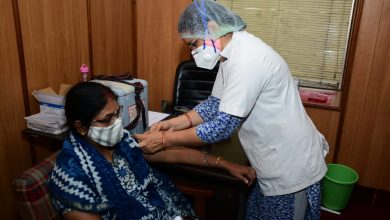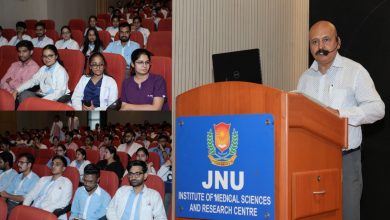
Jaipur
The plant pollen of Holoptelea integrifolia tree or chibil tree or bandar ki roti has been detected in the air earlier this year. Every year Holoptelea is detected in the month of March, but this time it was detected on February 28. It is the most allergenic plant pollen of the city.
Dr Nishtha Singh, executive director and chest consultant at Asthma Bhawan said that this pollen remains in very high concentration in air for the duration of one to two months. The presence of this pollen in air forecasts difficult times for those patients who are susceptible for allergies from pollen. She said this pollen is detected in the air with the help of an instrument known as the Burkard pollen counter. It is a pollen entrapment machine which has been installed at the rooftop of Asthma Bhawan, a respiratory centre and hospital in Vidhyadhar Nagar in Jaipur for the last 12 years. Daily pollen counting is being displayed on the website www.asthmabhawan.com that can be viewed by everyone and is especially useful for asthma and allergy patients.
Dr Singh said, “This pollen is present in higher concentration during morning and evening. The patients who have allergies to this plant should avoid going outside their houses and should cover the nose and mouth properly with a triple layered mask during morning and evening.” People are advised to limit their outdoor activities during this pollen season. It is the beginning of the allergic season as there is an upsurge in the number of asthma allergy patients visiting hospital OPD. This peak pollen season of Holoptelea will remain until the end of April and the patients present to the hospital with various symptoms including nasal watery discharge, breathing problem, wheezing, burning eyes and rashes, she added.
In Jaipur, one can find Holoptelea tree easily on every other street in large numbers. Most people are not aware about the ill effects of this tree even though the state government and civic bodies encourage its plantation. The trees are commonly found in government parks, Central park, Gandhi Nagar where people go for morning walks and fall ill. Around 10 % of asthma patients suffer from Holoptelea allergy. It becomes more important in COVID time for the asthmatic patients to keep their asthma in control and thus take proper precaution to keep away from exposure of Holoptelea pollen, Dr Singh said.
The expert said that every year Holoptelea is detected in March. Globally it’s a practice to forecast pollen in air just like weather forecast. But in India daily pollen counting is done by just two or three centers in the country, one of which is Asthma Bhawan. Therefore it’s a need of time that pollen counting should be emphasised in India and like the rest of the world we should also give a pollen forecast or pollen weather for Indian citizens.








